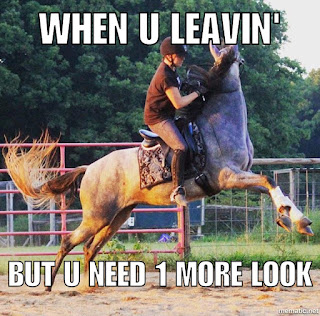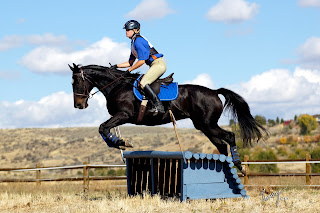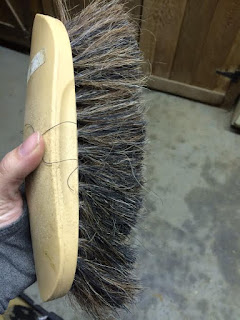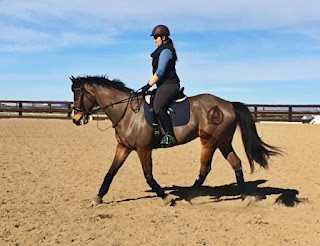Every time I open my mouth about eventing, I get bombarded with angry emotional tirades by people I don't even know (who frequently don't actually event, but are strangely emotionally attached to it) and every time, I swear I'll never do it again. But proving yet again that I might not be the smartest person on the internet, here I go.
 |
| the pinnacle of my "eventing" |
I assume you all heard about the tragic passing of both an event rider and a horse in unrelated incidents at a US-based 3* last weekend. I'm not here to sit in judgement on specific incidents--by all accounts, the world is now short one amazing woman and a completely irreplaceable animal. There are a lot of articles circulating the internet about them right now--I think the best is
this one, by a young woman who was deeply impacted by Phillipa.
No one with any sense is saying that either the rider or the horse was at fault and a lot of people with a lot of sense are fighting about how to fix the obvious and glaring problems. I don't have the answers and I'm definitely not here to chair a wholly-unqualified mob commission from my seat on the internet. Suffice to say, if you think you have the answers to fix a problem we can't quantify at this point, I also think you are an idiot.
That aside.
Eventing is digging it's own grave at an incredible rate right now. I've never evented above beginner novice and at this point in my life, it's unlikely to ever progress beyond that point. I cannot speak to what happens on course and that's not what this is about. I'm talking about the business model the
USEA and
PRO and modern American eventers have worked so hard to create. From a business perspective, this model is completely unsustainable.
Let's face it--eventing is the grass roots, common-man, Olympic-dreams sport in the way a pay-to-play discipline like show jumping or dressage can never be. International show jumping is populated with
celebrities and
billionaires. Want to go to the Olympics? Just drop
15mil on the literal nicest horse in the world,
hire the best coach in the world,
build the best facility in the world, and the
competition will come to you. It's somewhat the same in dressage--all y'all rocking those $90 kastel sunshirts--do you know who
Charlotte Jorst is?
Facsinating story there.
 |
| good thing they're nice shirts |
Eventing is the only FEI discipline in which a starry-eyed girl can buy a horse off the track for a few hundred dollars and make it to the elite upper levels. That is a
beautiful thing, in a
lot of ways.
But you know what it's not? A business model. That's why at the USEA convention, there are whole
seminars on convincing rich people to be "owners" of upper level horses and allowing the real athletes to ride them. Of course, here's the thing--while a
few people certainly own horses because they love horses and they love the sport and their version of collecting Breyer models is owning 7 horses at Rolex, that pool of people is very, VERY small.
For everyone else, they need to get something out of it. Obviously, eventing is a lot more dangerous than show jumping or dressage and requires a pretty specific personality type and a skill set that cannot be bought. That rules out most rich people who can afford to self-finance an international competition schedule. They themselves cannot compete at the top levels.
Ok, well what about event horses as an investment? I mean, Doug Payne
sold Running Order and another horse (
sob not over it) to not-figuratively
buy the farm. I don't know or care how much money changed hands, but you'll notice even WFP hasn't taken that horse to a 4* since then. Of course he did almost
metaphorically buy the farm last year, so who knows how that figures in.
What I'm getting at is this: according to this
study commissioned by the FEI, one of the biggest indicators for a rotational fall (which is how people and horses die) is the age of the horse--meaning the
Marilyn Little school of "ram em and jam em up the levels for a quick resale" is literally punching your ticket for a scary ass fall and if William Fox Pitt can't take a made 4* horse to a 4* event, well, then there really isn't a resale market for a 4* horse. Period. Eventing takes trust and a relationship between horse and rider and you can't buy that.
Michael Jung makes his own--wonder why?
So essentially, an upper level event horse is rapidly becoming a dud as an investment. No matter how many times Visa tells you something is priceless, what that means in real terms is that it has no value. Can't sell it.
And if you can't sell it, you can't insure it. Insurance is a business and it runs on actuaries putting real values on things and then betting that the thing won't just fucking die at an event. Which they are doing. Right now.
Well that leaves an interesting conundrum, doesn't it? What's the incentive to own an un-saleable, un-insurable so-called "investment" in a high-risk sport?
There isn't one.
That leaves two options:
1) The moneybags would-be owners walk away from the sport--it drops out of the Olympics and off the public radar. Professionals struggle harder than ever to make it, course design naturally degenerates to the scary-ass stuff they jumped in olden times because there's no money to pay designers and build fancy fences and so on.
2) The sport makes serious changes in terms of safety and accessibility so that the Olympic buy-a-medal program remains a viable option. The risk is greatly reduced, the prices of horses jump up another few notches, the ability of the girl-on-her-ottb to make it to the top becomes less than zero. The purpose-bred $$$$$$$ horse dominates, the sport professionalizes to the point of being unrecognizable, and the
Wellington eventing showcase is your new feature 4*. The sport you think you love no longer exists.
There are some appealing things about option 1--it's something
Denny Emerson and
Jimmy Wofford seem to advocate for, and obviously they've been around a while. There are some horse friendly outcomes in this and there is certainly an emotional appeal--you return the decision making to the horse people instead of handing it to the entertainers and accountants. There are also some really glaring drawbacks.
The first thing that comes to mind is simply the visibility--it's amazing how sports have to clean up when everyone starts looking. I think visibility is a huge part of horse and rider safety. If eventing were to drop off the map of the international scene, a lot of things could happen that otherwise wouldn't if there was more oversight. In addition, I really really don't understand all the people claiming that somehow going back to early-era eventing is a good idea. You think
Vicarage Vee was terrifying?
LOOK WHAT THEY USED TO DO. That's a nope. There is no question in my mind that with all it's drawbacks, the modern form of eventing is safer for horses and riders than whatever that horrifying bloodbath was.
So let's think about option 2. Money talks. Let's face it--dressage and showjumping, our equivalent international-level FEI-regulated events are essentially tests of which horse is the fanciest and most expensive, which means 99.999% of humanity cannot afford to compete. Obviously, horsemanship still plays in, but no one gets anywhere (on the international scene) with their OTTB. On the other hand, it's glamorous, fun to watch, and safe.
Moreover, there are also some horse friendly features to this model. Namely--horses stop dying in preventable ways. Public scrutiny is at a maximum and there is nowhere to hide a (metaphorical or real) body. The very real drawback is of course that when you can literally buy an Olympic medal, then you expect to and the welfare of the horse can be overlooked. Does this balance the increased scrutiny? Maybe?
Eventing is theoretically different because instead of being a fancy horse competition, it offered us the ability to test the sheer grit and heart of the horses and riders involved. The problem with that kind of test is failing it can mean death for horse and rider. We live in a safe, protected modern society that isn't comfortable with death and thinks that sacrificing good people and good horses on the altar of sport is disgusting bloodlust.
And frankly, I agree.
Modern eventing is going away. It cannot and should not survive.
What rises from it's ashes will be an interesting beast indeed.





















































